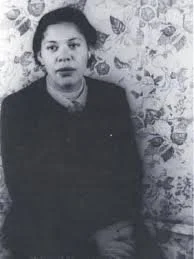The Trouble in Baltimore, the Literature of Ann Petry
Ann Petry (1908-1997)
If you want to understand the mayhem in Baltimore that occurred after Freddie Gray's entirely preventable death, get a copy of Miss Muriel and Other Stories (1971) by Ann Petry and read "In Darkness and Confusion," a novella based on the Harlem race riot of 1943.
First published in 1947, the wartime story is told from the perspective of William Jones, a Harlem resident very worried about his son, Sam, a soldier stationed in Georgia. Sam's letters home have stopped and Jones, unable to stand the silence, laboriously writes a note that barely scrapes the surface of his love and concern: "Is you all right? Your Pa."
The inquiry goes unanswered. Jones eventually learns that his son, refusing to sit in the "nigger end" of a bus, traded gunshots with a white MP and ended up court-martialed and sentenced to twenty years of hard labor.
A day after learning this terrible news, which he withholds from his wife, Jones witnesses an altercation between a white policeman and a black soldier. The officer shoots the soldier; an ambulance takes the man to a Harlem hospital; a mob fills the streets and officers on horseback quickly arrive.
Jones sees his private agony writ large in the public spectacle. He has spent his life following the white man's rules even though those rules degrade him and his family at every turn. His powerlessness has made it nearly impossible for him to express himself, and his brief exchanges with his wife and his wayward niece, Annie May, reveal nothing of the deep love and compassion he actually feels for them. Despite these bleak circumstances, Jones had hoped and believed his son could have a better life than his own.
As the mob's angry energy propels him forward, he feels like part of something larger than himself for the first time. The problem is, that something is volatile, malevolent, and on the verge of exploding.
When he comes face to face with his wife, Pink, she says, "What you doing out here in this mob? A Sunday evening and you drinking beer." The dramatic circumstances provoke Jones to speak directly, if haltingly, to his wife:
For a moment he couldn't answer her. All he could think of was Sam. He almost said, "I saw Sam shot this afternoon," and he swallowed hard.
"This afternoon I saw a white cop kill a black soldier," he said. "In the bar where I was drinking beer. I saw it. That's why I'm here. The glass of beer I was drinking went on my clothes. The cop shot him in the back. That's why I'm here."
He paused for a moment, took a deep breath. This was how it ought to be, he decided. She had to know sometime and this was the right place to tell her. In this semidarkness, in this confusion of noises, with the low, harsh rhythm of the footsteps sounding against the noise of the horses' hoofs.
A short, obese woman in fragile health, Pink erupts in anguish when she learns her son's fate. After emitting a wail that "echoed and reechoed the length of the street," she leads the crowd in vandalizing stores and looting merchandise. Jones joins in. His pride in his wife's defiant aggression gives way to a sick feeling of defeat. The riot seems like a nightmare, but he knows "this was no dream but a reality from which he couldn't escape."
As if in a trance, Pink continues on her rampage. As Jones looks on, she takes hold of the iron gate separating the mob from a liquor store:
The gate began to bend and sway under her assault. Then it was down. She stood there for a moment, staring at her hands--big drops of blood oozed slowly over the palms. Then she turned to the crowd that had stopped to watch."Come on, you niggers," she said. Her eyes were little and evil and triumphant. "Come on and drink up the white man's liquor."
The riot empowers Pink in the worst possible way: it gives her license to debase herself and her community.
The parallels between the events in Petry's novella and the trouble in Baltimore are obvious. But because it is fiction rather than a fast-changing news story, we can deal with "In Darkness and Confusion" calmly and reasonably. The horrifying denouement, which I won't spoil here, invites empathy and compassion rather than finger-pointing or a helpless wringing of hands.
Literature–if it really is literature–always challenges us to go beyond florid sentiment and grow as thinkers, as human beings. In this particular instance, Petry's novella of the 1940s offers us an excellent way into that meaningful conversation about race that our national leaders keep saying we ought to have.

